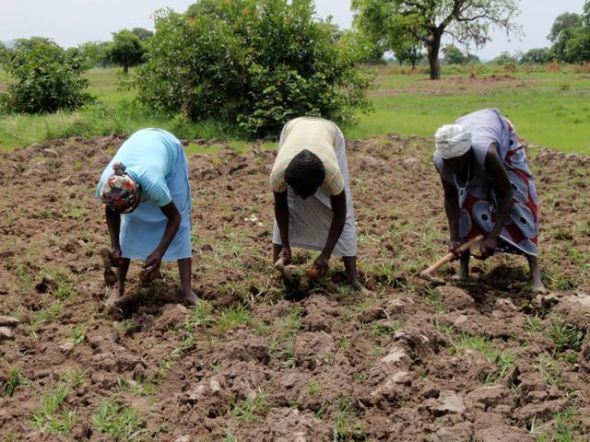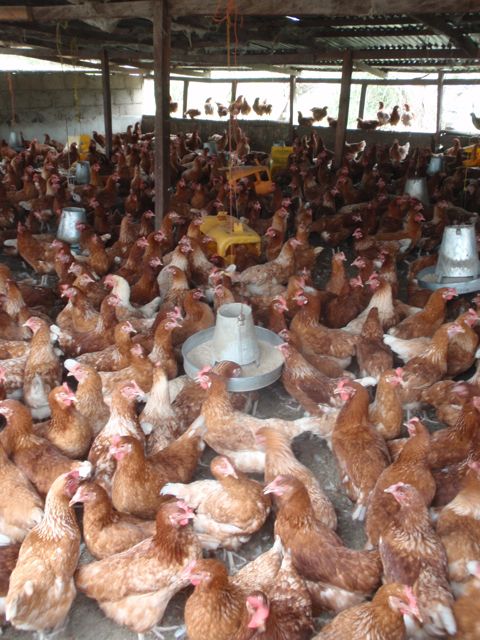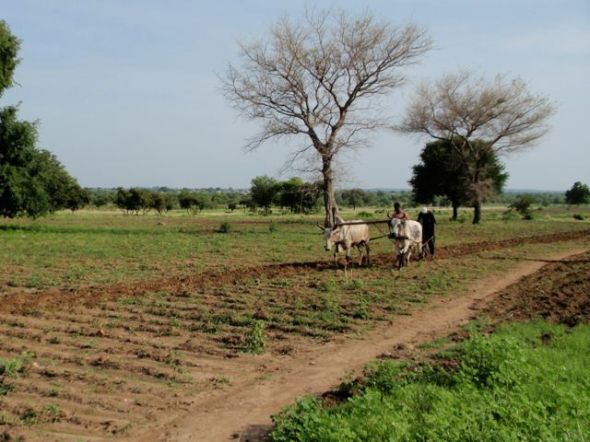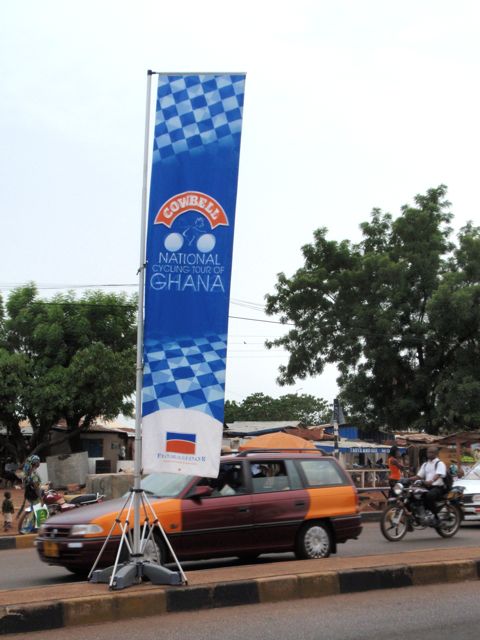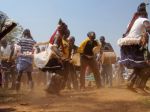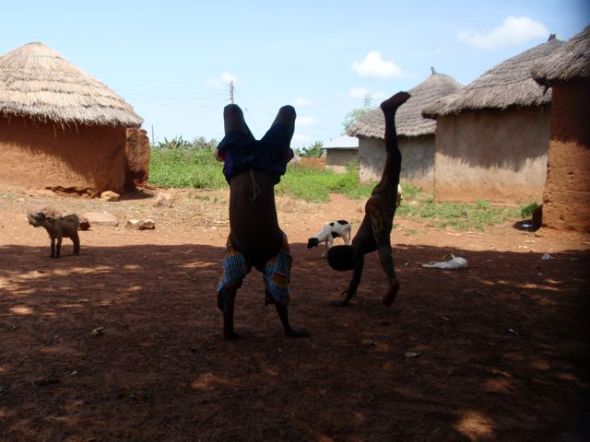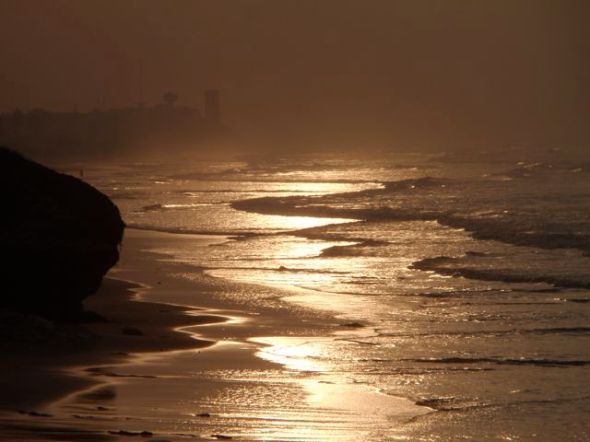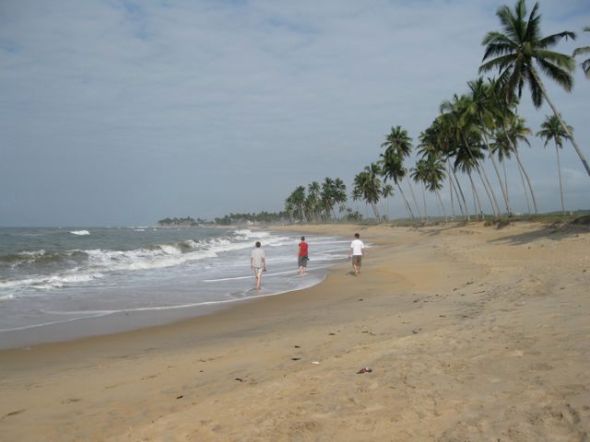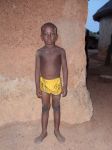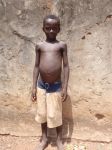Sustainable Food Security: Agricultural Models for the 21st Century
This is a post for Blog Action Day (#bad11), a movement that aims to start a global discussion through thousands of blogs posted in one day on the same topic. This year, the topic is one dear to my heart: Food. I have been thinking about food a lot for the past 1.5 years through my work in agriculture with EWB. We are working closely with the Ghanaian Ministry of Food and Agriculture to reach out to farmers, but what are we working toward? This question has nagged me more and more as time goes on, to the point that I ran a learning session at our last EWB retreat with the same name as the title of this post – Sustainable Food Security: Agricultural Models for the 21st Century.I’ve been reading a lot on this topic in the past 8 months. I’m not sure if there’s a trend toward addressing this issue lately, or if I’m just noticing the articles because I’m finally looking for them, but there is a LOT of writing out there! I’ve summarized a few of my favourite articles in the “Further Reading” section at the end of this post.
I have been thinking about food a lot for the past 1.5 years through my work in agriculture with EWB. We are working closely with the Ghanaian Ministry of Food and Agriculture to reach out to farmers, but what are we working toward? This question has nagged me more and more as time goes on, to the point that I ran a learning session at our last EWB retreat with the same name as the title of this post – Sustainable Food Security: Agricultural Models for the 21st Century.I’ve been reading a lot on this topic in the past 8 months. I’m not sure if there’s a trend toward addressing this issue lately, or if I’m just noticing the articles because I’m finally looking for them, but there is a LOT of writing out there! I’ve summarized a few of my favourite articles in the “Further Reading” section at the end of this post.
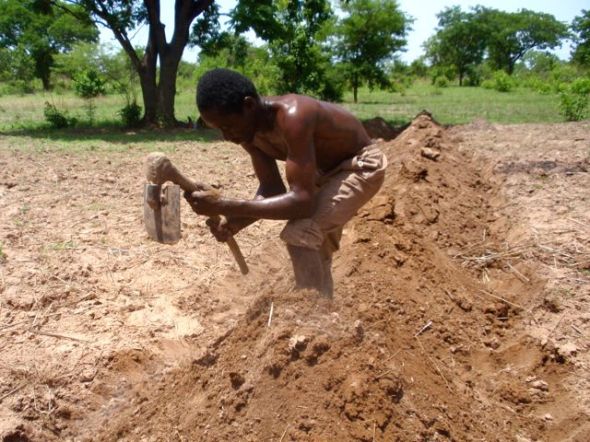 The Issues
The Issues
First, let’s get to the heart of the issue: it’s a matter of food production vs. environmental sustainability. Traditional industrial agriculture has achieved record production through intensive farming practices, mechanized farming and petro-chemical inputs applied with machine-like precision. This has come at the expense of the environment, with corporate farms using up precious fossil fuels and destroying ecosystems in the quest for more food. However, viewing these as two opposing goals is a false dichotomy; if we want to achieve food security far into the future, we must find a way to fulfill both of these goals AT THE SAME TIME! My research into this topic has tried to answer this question: what model of agriculture will allow us to achieve sustainable global food security?
Development workers have a unique perspective on the problem of global food security because we must take into account an additional question, “what is good for poor farmers?” In this case, it’s not just about achieving adequate food production, or nutrition levels, or even environmental sustainability. We must also take into account the lifestyle of the poor Ghanaian farmer, who is being asked to adopt this model to continue providing food for his fellow citizens. What model of agriculture will spur human development in Ghana while also fulfilling the above two goals?
Though I mentioned that there are a lot of people writing on this topic right now, there is a relatively low level of consensus as to what the future model of global agriculture should be. There is a never-ending number of models being promoted (organic, agroecology, industrial, urban, etc.), each with its own convincing arguments and promoters. This is quite startling, and makes it very difficult to choose one agricultural model to promote in our work. So how can we plan for the future?
Let’s be very clear here: the following are my personal opinions, not those of EWB, Ghanaian farmers, or anyone else you might confuse me with. There is no right answer, only a series of thoughts and questions that remain to be determined.
Traditional agriculture in Ghana is somewhat organic, in the sense that there are no chemicals applied to the crops. Most farmers practicing these traditional methods also don’t use improved seeds, proper land preparation techniques or any other Good Agricultural Practices (GAPs). As a result, they get low yields compared to their neighbours who use “modern” techniques – mechanized land preparation, chemical fertilizers/herbicides/pesticides, and better GAPs. This is leading Ghanaian farmers to see chemical agriculture as the way forward, when in fact many of these GAPs applied to their traditional organic fields would also increase yields significantly.
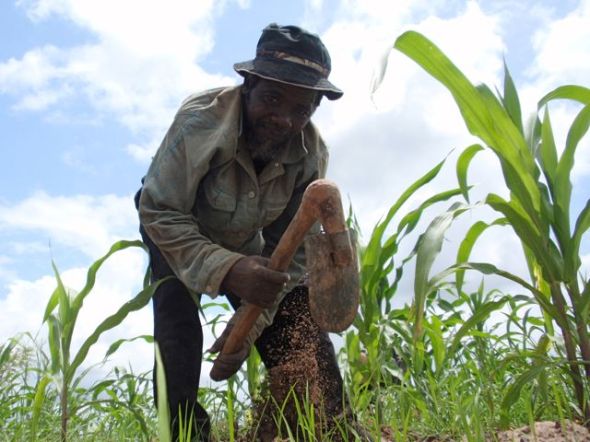 Right now, MoFA is steering Ghana toward a future of intensive industrial agriculture through credit-in-kind schemes and input subsidies. And why shouldn’t they? This is the path every other industrialized nation has taken to get out of poverty and push forward their economies. But I think it’s too late to take this path. The time has come when oil-based agriculture is getting too expensive (and oil prices are too volatile) to rely on. The price of oil will only increase in the next 20 years, so why are we promoting a model of dependence on these inputs in Ghana?
Right now, MoFA is steering Ghana toward a future of intensive industrial agriculture through credit-in-kind schemes and input subsidies. And why shouldn’t they? This is the path every other industrialized nation has taken to get out of poverty and push forward their economies. But I think it’s too late to take this path. The time has come when oil-based agriculture is getting too expensive (and oil prices are too volatile) to rely on. The price of oil will only increase in the next 20 years, so why are we promoting a model of dependence on these inputs in Ghana?
If things go ahead as MoFA wants them to, soon the majority of Ghanaian farmers will be using industrial agriculture methods. Food security in the country will be improved, but for how long? Soon fuel prices will be too high for Ghanaians to afford the food produced in this manner, and we will be thrown back into food insecurity. Ghana is at the brink of “maturity” in agriculture, about to choose a method to promote and follow for decades to come. Let’s help them make an appropriate and sustainable choice.
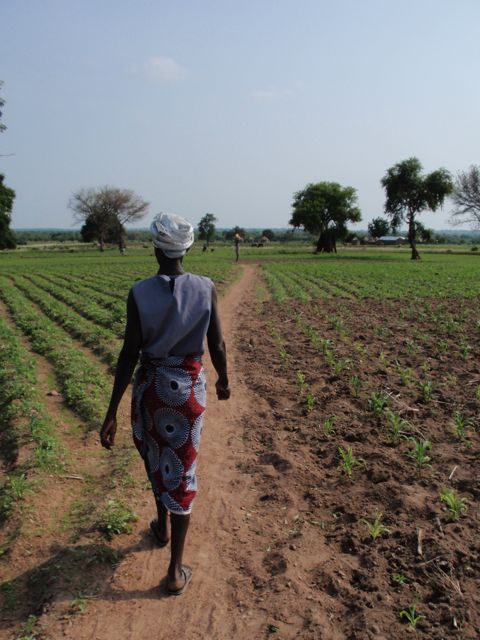 My colleague Mina works with an organic fertilizer company near Tamale and often cites a study that showed yields to be virtually the same when appropriate amounts of chemical and organic fertilizer were applied to test fields. In fact, the plot with the highest yields used a combination of both types of fertilizer. So why are these methods most often presented as mutually exclusive?
My colleague Mina works with an organic fertilizer company near Tamale and often cites a study that showed yields to be virtually the same when appropriate amounts of chemical and organic fertilizer were applied to test fields. In fact, the plot with the highest yields used a combination of both types of fertilizer. So why are these methods most often presented as mutually exclusive?
There are many sustainable practices being used in Ghana on a small scale – sustainable land management, soil fertility techniques, inter-cropping to naturally get rid of pests, organic fertilizers and weedicides and many other GAPs. What are the best ways for EWB to promote these techniques without being paternalistic and dictating the way forward for Ghana’s agricultural development? Tricky…
I think one of the key lessons here is that we need to be adaptive, changing our approach depending on the conditions (economic, social and environmental) in which we find ourselves. Of course, these conditions are changing all the time, so we need to be constantly testing our assumptions, checking if the information we gathered 1 year, 6 months or even 2 weeks ago is still relevant today. And we need to help the Government of Ghana to have the same resilient approach, adapting to new information and conditions as the world lumbers toward a new model for sustainable food security.
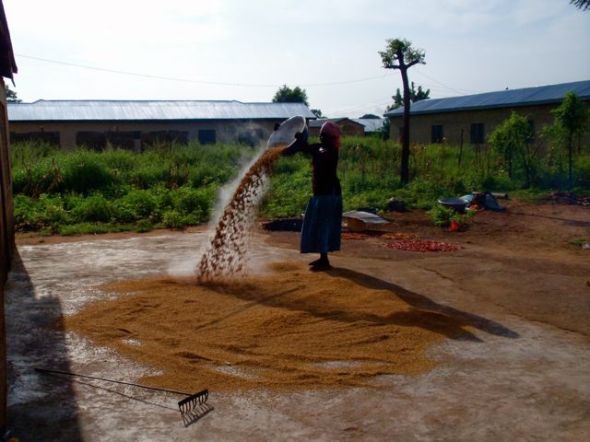 More Details
More Details
Different levels of thinking about this:
- Global food systems
- Consumers in Canada
- African agriculture
- Farmers
- EWB’s stance
- Our strategies
More questions to ponder…
- How do we bridge economic development & environmental sustainability in Africa?
- What are the pros and cons of each agricultural model?
- How do these changes in policy translate to realities on the ground?
- What stance should EWB and other NGOs take on these issues? How will this effect our work?
 Other tricky issues (you can Google these for more info):
Other tricky issues (you can Google these for more info):
- African land grabs
- GM crops
- Foreign investment
- Subsidies
- Food price volatility
- Climate change
- Famine
- Biodiversity
- Farmers’ rights
- Biofuels
Special report on the future of food – population, development, environment, politics, nutrition, food waste:
- ‘A Prospect of Plenty’. The Economist, Feb. 24, 2011. http://www.economist.com/node/18200642
Politics, global markets, demand for food:
- ‘The new geopolitics of food’. Foreign Policy, May/June, 2011. http://www.foreignpolicy.com/articles/2011/04/25/the_new_geopolitics_of_food?page=full
Olivier De Schutter, UN Special Rapporteur on the right to food, and the concept of agroecology:
- ‘Save climate and double food production with eco-farming’. IPS, Mar. 8, 2011. http://www.ips.org/africa/2011/03/save-climate-and-double-food-production-with-eco-farming/
- ‘Sustainable farming can feed the world?’. New York Times, Mar. 8, 2011. http://opinionator.blogs.nytimes.com/2011/03/08/sustainable-farming/
Agroecology and development:
- ‘Can the world feed 10 billion people?’. Foreign Policy, May 4, 2011. http://www.foreignpolicy.com/articles/2011/05/04/can_the_world_feed_10_billion_people?page=full
Organic farming:
- ‘Study debunks myths on organic farms’. Star Phoenix, Sept. 27, 2011. http://www.thestarphoenix.com/business/story.html?id=5462520
- ‘Organic agriculture: deeply rooted in science and ecology’. Grist.org, Apr. 21, 2011. http://www.grist.org/sustainable-farming/2011-04-20-eliot-coleman-essay-organic
- ‘On agricultural productivity and food security’. Ed Carr, Open the Echo Chamber. Sept. 26, 2011. http://www.edwardrcarr.com/opentheechochamber/2011/09/26/on-agricultural-production-and-food-security/
Concentrated industrial vs. wide-spread “nature-friendly” agriculture, which is better for the environment:
- ‘Farming: Thoughts on an intense debate’. BBC, Sept. 2, 2011. http://www.bbc.co.uk/news/science-environment-14761015
Smallholder farmers and environmental sustainability:
- ‘Global food crisis: Smallholder agriculture can be good for the poor and the planet’. Guardian, June 1, 2011. http://www.guardian.co.uk/global-development/poverty-matters/2011/jun/01/smallholder-agriculture-farming-good-poor-planet
Findings of DuPont Advisory Committee on Agricultural Innovation and Productivity for the 21st Century:
- ‘Food security has global implications’. Politico.com, June 7, 2011. http://www.politico.com/news/stories/0611/56342.html
Moving from old to new models of agriculture:
- ‘A warming planet struggles to feed itself’. New York Times, June 4, 2011. http://www.nytimes.com/2011/06/05/science/earth/05harvest.html?_r=2&pagewanted=all
- ‘The farms are not all right’. Walrus, October, 2011. http://www.walrusmagazine.com/articles/2011.10-food-the-farms-are-not-all-right/
Outdooring: a joyous occasion
Yesterday was the outdooring for my friend Farouk’s new baby. This is a ceremony that is held 7 days after the birth of a baby here in Ghana, and it is the occasion when the baby’s name is announced to the world. So I present to you: Mohammed Taiwab!
This little guy is so small and super-cute! He slept the whole time I was there, despite the crowds of squawking women and the fact that he was passed from person to person every 2 minutes. I guess that’s what you do when you’re 7 days old? Maybe?
The outdooring starts in the wee hours of the morning, when the women start preparing food. People come and gather, men in one place and women in another, to celebrate with the parents. People get dressed up, food is served and everyone generally has a ball. Each guest will give something small to help with the new baby, like soap, baby clothes or some small money.
The first-time mother is surrounded by her mother and sisters, all of whom have come to help her with her new task of taking care of a baby. In many cases, she will actually go and live with her mother or female relatives for the first few months of the baby’s life, to learn how to take care of it/him/her properly. This is great for the father, who doesn’t have to deal with the crying baby in the middle of the night, but he also loses out on some bonding/loving time!
Farouk is a great example of a modern new father from Tamale. He is an electrician (he does all our electrical work and won’t let us pay him!) and he used to live right next door to Ben and I. He runs an electrical shop on the main road and you can find him there from 8am to 10pm – he works a lot! We’ve become good friends over the past year. Many times we’ve discussed his approach to marriage, fatherhood, life, etc. and how it differs from traditional beliefs in this area.
For example, even though he is Muslim, Farouk doesn’t want to have multiple wives. He himself is the son of a man with 3 wives, and he saw how difficult it was for the family, especially those 3 women. His own mother left his father when Farouk was young and took him to live somewhere else. (There’s not really any such thing as divorce in northern Ghana, at least it’s not common… but as far as I can tell, Farouk’s mom was outta there!) He says having multiple wives causes too much conflict, so he’ll stick with one, thank you very much.
Farouk has also told us that he will never beat his kids. Unfortunately, this is a VERY unusual stance in this area. It is quite normal to punish children with smacks, sticks and other forms of corporal punishment. I think this is very much a classic case of those who’ve been beaten taking it out on those who are “below” them on the food chain. When you grow up in a culture of physical abuse, it’s very difficult to change your mindset and the abused often becomes the abuser. But somehow Farouk has decided that it isn’t right, and it’s not the way he’ll discipline his kids. Good on you, Farouk!
I’ve enjoyed spending time with Farouk, who always, always has a smile on his face. He and his wife have been so excited for the new baby to arrive, and now he’s finally here. I know they will take good care of him and shower this kid with love, and I can’t wait to watch him grow. Welcome to the world, Mohammed Taiwab!
Days Like These
There are some days when it’s obvious that you’re working in a developing country. Today was one of them.
It rained again today. It started in the morning, when I was still in bed. Despite the soothing rain-drumming-on-the-roof sound tempting me to stay there, I forced myself to get up, work out, shower and get ready to go to the office. During a brief lull in the rain, Ben and I headed off to the egg-and-bread stand for breakfast. We found several of our colleagues there, hiding out in a veranda to escape the drizzle-turned-downpour. And then, it REALLY started to rain. It rained and poured for over an hour, creating massive floods of water overflowing the storm gutters and running through yards and along the road. Once the downpour subsided, we still had to wait almost another hour to escape the aforementioned veranda, which had become an island in the middle of a river. Mina and Romy’s motos were our water-mark measures, showing that at least 8 inches of water were flowing along the dirt road to join the deluge of the overflowed gutters. We finally escaped and tip-toed home through puddles full of dirt, worms, garbage and, invariably, shit. Gross.
We arrived back at our house to find something out of a disaster scene on a news broadcast. Our place was fine, as our veranda and door are raised up, but our landlord’s house next door had flooded for the first time in almost 20 years. Water had entered every room, and we went in to find books stacked on tables stacked on chairs in an effort to get everything up off the floor that could be damaged. The dirty water was everywhere, including the maize storage room, where it had ruined several bags of maize before someone remembered to look in there. That is part of this 15-member household’s food supply for the year, gone in a few short minutes. We spent the next couple hours helping them to scoop, sweep and propel water out of the house, pulling up carpets and emptying the furniture along the way. We emptied the house of its contents in order to bring them out in the sun to dry. There was a mattress on the roof, clothes hanging in the tree and chairs scattered around the lawn. It looked like a tornado had hit. One boy had 2 netbooks on the floor of his room that had both been soaked, so we put them in rice to try to save them.
At one point during the effort, one of the women asked me, “Does this happen in Canada?” I replied that yes, floods often happen, and in fact there had been some serious flooding in the US this summer where people’s houses were even washed away. She was surprised to hear this, and accepted that these freak natural disasters can happen even in profitable places.
But the problem is that this wasn’t a freak natural disaster; it’s the result of poor planning. Tamale is a huge and ever-growing city, made mostly of concrete, with insufficient storm gutters to take all of the water safely out of the city limits without dropping it on people’s homes. Apparently the extra water came today because one of the dams in town overflowed, sending a wave of water our way. But this wouldn’t happen if the engineers who designed the roads, gutters and storm drains did their work properly! The fact is, a flood of this nature would make the news in Canada. Here in Tamale, it’s just an everyday occurrence during the rainy season.
I never did make it to the office today. In fact, this is the first time I’m turning on my computer today. I had big plans for the work I was going to get done, but none of it happened. And that’s the reality of life in a country like Ghana. You can make big plans, but you just have to take things as they come.
Sure, today the rain spoiled my plans and some of my neighbours’ stuff. But it also gave me a chance to connect with people – first with my EWB colleagues, as we huddled out for 2 hours on a 4’x8′ square of covered concrete, then with my neighbours as we worked together. I was impressed, as I so often am, by their cheerful and resilient spirit, laughing and joking together even in the face of this disaster. Ghana has taught me so much about what is important in life – not your expensive carpet, but family, friends, togetherness, your ability to survive and to enjoy life!
Here are a few videos to show you the extent of the rain and how we feel about it:
Update
Hi everyone,
Again, it’s been quite a while since I posted. Sorry about that! Life has been crazy busy lately, so I just wanted to post a short update about what life has been like lately.
August was an INSANELY busy month, with 6 summer students leaving (we miss you!), 5 new volunteers arriving, 2 weeks of meetings for EWB’s African Programs Leaders and… my 2-week Canadian vacation!
The 2 weeks of Team Leader meetings were held at the beautiful Lake Point Guesthouse on Lake Bosumtwe, near Kumasi, Ghana with ~10 super-inspiring leaders from EWB. The beautiful lakeside location provided an ideal place to step back from the day-to-day business of running an EWB team to think about our long-term strategy as an organization. Here are a few of the questions we discussed during the meetings:
- What are our theories of change within each team? How can we learn from each others’ experience?
- What are the investment criteria for EWB as an organization to invest in new or ongoing initiatives? What combination of results, potential and leadership needs to be in place?
- How can we invest more in EWB’s leadership pipeline, so great people continue to flow into our African Programs?
- How can we hire and use local staff effectively?
- What are various pathways to scale our change, either theoretical or from experience?
- What are the teams’ strategies for influencing the “big players” in their sectors?
- What is EWB’s overall vision? (We are currently undergoing a visioning process as an organization, pretty exciting to participate in!)
It was amazing to discuss these questions and to get/give feedback on our strategies. My brain was hurting! It was pretty intense – we even had a random woman buy us a round of drinks when she saw us working until 7pm on a Sunday, haha. Here are a few of my main take-aways from the meetings:
- Our team has come a long way! We were in a pretty rough spot last February, but we have really turned around and come back strong. I’m excited about the things we’re currently working on and can’t wait to see where another 6 months takes us!
- That said, I feel we have a long way to go in developing and articulating our strategy. These meetings were an AMAZING opportunity to push my strategic thinking and articulation further, so it’s something I’m passionate about pushing forward over the next 4 months. More to come on this blog!
- I think we need to invest a LOT more in understanding influence pathways for the agric sector (specifically public sector) in Accra. We’ve been trying to find out how to leverage our relationships, but there’s actually a lot of ground work that still needs to be done before we can do that.
- I’m also excited to build on more of the strong synergies between the 3 agric teams in Ghana – our public sector team, the Agric Value Chains team and Business Development Services. We’re all doing similar exciting things, and I hope we can find systematic ways of sharing and learning from each other.
- We really need to plan ahead, but it’s really HARD to plan ahead. Yeah, big learning, right? I’m being asked to project how many African Programs Staff we’re going to need in the next year, but it’s so hard to tell – will we still be searching? prototyping? scaling something up? doing a pilot in 2 districts, or 20 districts? At least I’m really happy to work for an organization that is so flexible and will allow us to adapt (to a certain degree) as things change. Pretty cool!
- EWB is exciting! We are developing a really inspiring model and I feel the African Programs vision is pretty inspiring as well. It makes me proud to work for such an organization and to be invested in the leadership of EWB 🙂
After the last day of meetings, I headed to Accra to fly to Canada. I arrived on a Saturday morning, was greeted by my lovely family, and whisked away to the cottage. It was spectacular!
After an exhausting month, 10 days at the cottage of eating, sleeping, drinking and dock-sitting was just what I needed. It was super-relaxing and we had beautiful weather (most of the time!).
After that, I returned home for a few days of errands, catching up with friends and visiting with my Gramma. It wasn’t long, and before I knew it (2 weeks to the day) I was back on a plane to Ghana! But I’ve arrived back feeling refreshed and rejuvenated, ready to dive into the “fall semester” – our busiest time of the year!
Of course this first week back in Ghana has been a bit nuts, trying to get caught up with everyone and everything. I’m working on the budget and “strategic plan” for our team for next year, which is difficult to say the least. But it’s been amazing to get home, unwind and unpack. Ben and I just moved to a new place right before I left for Kumasi. We’re still settling in, but so far it’s wonderful – both the house and the family we’re living beside. All in all, I’m getting ready for a great few months until Christmas!
It’s rainy season here in the north, and we were hit with a monster rainstorm yesterday afternoon. Don and I had a fun bike ride home from the office to discover that not only were all the dirt roads flooded, but the paved ones too! A few pics to tell the tale:
That’s all for now. Just a quick update! I hope I’ll be back to some more regular blogging soon – I’ve got a few in the pipeline that I’m looking forward to writing, so stick around!
Always Something Going On In Tamale!
A few weeks ago I was hurrying from my office on one end of town to a meeting on the other end, when my taxi was diverted off the main road. I thought to myself, “oh great, I’m going to be late” when suddenly a bicycle passed us. Wait… what?! I did a double-take and sure enough, a Ghanaian wearing a helmet, bike shorts and clip-in shoes on a fancy-looking road bike was zooming ahead. When you compare this to the rest of the cyclists I regularly see in Tamale (no helmets, sandals, sometimes scrappy-looking bikes) you realize why it was so shocking. I had inadvertently found myself in the Tamale leg of the National Cycling Tour of Ghana!
I decided to be late for my meeting to explore this phenomenon. It was a great time! I snapped a bunch of photos, which you can see below. It was pretty Tamale-esque as they hadn’t quite closed the road for the race. The traffic cops would hold back the traffic for a while then let a big group go through and they would mingle with (and almost knock down) the cyclists on the way to their destinations. Almost-like-a-bike-race-in-the-West-but-not-quite.
I was impressed by these serious guys with their huge legs, but laughed out loud at the “Ghanaianisms” that still came out in the race. For example, instead of water cups or bottles, race volunteers were handing out water sachets to the cyclists (that’s how most people drink water here, in small bags). Also, the cyclists were akin to taxi drivers, yelling out “hey Charlie, hey!” (a common name to call each other, like “hey friend”) and yelling at length when someone cut them off, then getting over it in 20 seconds. Hilarious.
Anyway, it was a welcome little break from my work day, and a reminder that there’s always something going on in Tamale. Enjoy the photos!
Happy Farmer’s Day!
Last Friday was National Farmer’s Day in Ghana, which is a national holiday to celebrate farmers and their role in the country (it’s a big role!). Everyone enjoyed the day off – except Agric staff, who were working their butts off!
Each district holds a Farmer’s Day celebration in one of the villages. This year our celebration was in Dunyii, a small village on the road heading east out of Tamale. There were tons of plastic chairs, canopies to shade people from the sun, a microphone, loudspeaker, etc. – all the trappings of a formal engagement.
The day started off early with staff getting to the site to set everything up. The “big men”, including politicians, government workers, and heads of local NGOs, started arriving around 9am. The day was kicked off around 10am with some welcome speeches and music/dancing/drumming by a local cultural group. It was great!
There were a few other speeches, and prizes were awarded to several farmers in the district. These prizes include Best Metro Farmer (the overall best prize, including a bicycle, cutlasses, roofing sheets, Wellington boots, a radio, fertilizer, and other goodies), Best Woman Farmer, Best Youth Farmer, Best Agric Staff and Best ___ Farmer for all kinds of crops – Yams, Maize, Soya, Cattle, etc. It was a wonderful day!
After the formal celebration ended, we cleaned everything up and headed back to the office, where food and drinks were served to celebrate and appreciate the staff. Then everyone took off early to watch the National Farmer’s Day Awards on TV (yeah it’s a big deal!).
The purpose of Farmer’s Day is to celebrate farmers. It’s a tradition that’s been happening now for 26 years. I think it’s a great idea. But sometimes the real focus of the day – the farmers – gets lost in the politics. This is indicative of a larger sentiment throughout MoFA, which is becoming more and more influenced by political figures and programs. But really, the purpose of MoFA and what I’m working to promote is to SERVE FARMERS WELL.
A gallery of photos from the day is attached. Have a look!
Happy Farmer’s Day!!
- MoFA staff getting the prizes ready
- One third of the people watching the festivities
- Ramat addresses the crowd
- A drummer gettin’ down
- The three drummers who played at the celebration
- Traditional dancing
- A dancer
- Women dancing during the celebration
- My Director telling the local dignitaries about the AAB program
- Some of the Ghanaian crops on display
- Two of the women who won prizes at Farmer’s Day
- The Metro Coordinating Director for Tamale awarding the Best Youth Farmer
- The Award Winners
- Mustapha and I with my AAB poster for Farmer’s Day
Happy Thanksgiving!
It’s that wonderful time of year when Canadians stuff themselves with turkey and pumpkin pie: Thanksgiving. Even though I won’t be home to celebrate this year, I wanted to take a few moments to give thanks for the things in my life.
10 Things I’m Thankful for in Canada:
- My family
- Vegetables
- Access to clean water & food, sanitation, infrastructure, etc.
- Racial anonymity
- Some semblance of gender equality
- Really good internet
- A developed economy and strong governance
- Access to education
- Healthcare
- Cheesecake
10 Things I’m Thankful for in Ghana:
- My Zuo family
- Ghanaian hospitality (which is unrivaled around the world, I’m sure!)
- My usually-stable health
- Having Ben here to work with and support one another
- Strong communities
- The amazing, dedicated MoFA staff I work with every day
- Living life outdoors
- Stone lager
- The best job in the world
- My amazing EWB team-mates!
I’m so lucky to have loving people in my life, both back in Canada and here in Ghana. This morning I went for the first time in 3 weeks to visit my family in Zuo. I was welcomed by huge smiles and cries of “Pumaaya!” (my Ghanaian name) as I pulled my moto into their yard. It’s such a wonderful feeling to be welcomed into their home, which feels like my home too. A lot happened in those 3 weeks, including the welcoming of a beautiful new baby girl, Anifa, into the family (photo below).
Later today I will be surrounded by different people, my Canadian friends, as we gather at a local restaurant for a Ghanaian Thanksgiving dinner. I am so grateful for all of these people who are here to love and support me, through good times and bad, while I find my way through this Ghanaian life.
Gone fishin’
My family recently came to visit me in Ghana and we went on a whirlwind tour. See the photo highlights below!
We started in Accra, the capital of Ghana:
Then we flew up to Tamale, my home base, and visited my village, Zuo. First we all learned about getting water:
Then we brought out the gifts – lots of books and educational materials:
After that we headed back down south to visit the Cedi Bead factory:
And the Akosombo Dam:
Before some rest, relaxation and swimming at Aylo’s Bay:
Next we headed to the beautiful and remote Volta Region on Ghana’s eastern border:
Next we headed to Cape Coast, Ghana’s former slave trade capital:
And we wrapped things up in Elmina, another former slave trade town:
It was a wonderful vacation! Thanks for coming Mom, Dad and Blair – you’re very brave 🙂
Now back to our regularly scheduled program…
Beauty
This probably sounds weird, but it’s amazing how often I’m reminded of my cottage in Ghana.
Lately I can close my eyes, feel the sun on my face and cool breeze in my hair, and picture Georgian Bay stretching out in front of me. And sometimes when I’m riding my moto, it sounds like a motorboat bouncing across the waves (luckily I don’t close my eyes for that one).
But when I open my eyes, I’m back in Ghana – and I’m happy for this. Ghana has really grown on me in the last 5 months. I think I complained at first: “Ghana is an ugly country, there’s no physical beauty in this land”. But as the dry season gives way to rain, I’ve discovered that it’s actually a beautiful landscape – green vegetation, blue skies dotted with clouds, sunrises and sunsets to die for, and the craziest storm clouds and lightning in the world.
I’m starting to see beauty everywhere I look, beyond the physical landscape to the gentle sway of women’s hips as they carry firewood along the road, past the chaos of the market to the brightly-coloured clothing of the market vendors, underneath the dirt on childrens’ faces to the smiles in their eyes as they run to greet me when I get home.
My work is busy and every day is full of purpose. I have a wonderful team of inspiring people to work with, both in EWB and MoFA. Every day I go home to a simple family who welcomes me without a second thought.
And I realize why it feels like the cottage: I’m happy here.
Perceptions of Poverty
An EWB colleague in Malawi, Duncan McNicholl, has recently received a lot of attention for a project he started called Perspectives of Poverty. The project aims to show another side of Africa, the one not commonly shown in news reports and NGO publications.
Africa is often portrayed in the West with photos of fly-covered children in torn clothing. Duncan’s reaction: “How had these photos failed so spectacularly to capture the intelligence, the laughter, the resilience, and the capabilities of so many incredible people? … I thought that these images were robbing people of their dignity, and I felt that the rest of the story should be told as well.”
Duncan told me about his idea while we in Toronto together for our pre-departure training with EWB. He wanted to show the same “poor” person in two photos: one looking typically poor, with dirty clothes and a sad expression, and one looking fabulous, all smiles and Sunday best!
It sounded awesome – I wanted to try it too! But when I got to Ghana I had trouble thinking about how I would communicate this idea to the people around me. Had they seen these photos of “typical” Africa in the West? What would they think of me asking them to “look poor” so I could take their picture?
Finally, a couple of weeks ago, Duncan put up his first stab at the project with photos of 2 friends. It looked great, and finally gave me the resolve to try it on my own. So after carefully explaining the project (and possibly being understood), here are some of my own contributions to the Perceptions of Poverty project!
- Poor Hakim
- Rich Hakim
- Poor Imman
- Rich Imman
- Poor Maliki
- Rich Maliki
- Poor Saleman
- Rich Saleman
- Poor Wekaya
- Rich Wekaya
- Poor Salifo
- Rich Salifo
You can read more about Duncan’s project on his blog, on the popular Aid Watch blog, on the blog Poverty to Power by Duncan Green (Oxfam UK), or in an online New York Post article. Congrats on all the press, Duncan!

